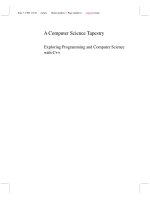programming and problem solving with c++ 6th by dale ch02
Bạn đang xem bản rút gọn của tài liệu. Xem và tải ngay bản đầy đủ của tài liệu tại đây (867.45 KB, 45 trang )
Chapter 2
C++ Syntax and Semantics, and
the Program Development
Process
Chapter 2 Topics
Programs Composed of Several Functions
Syntax Templates
Legal C++ Identifiers
Assigning Values to Variables
Declaring Named Constants
String Concatenation
Output Statements
C++ Program Comments
A C++ program is a collection
of one or more functions
There must be a function called main()
Execution always begins with the first
statement in function main()
Any other functions in your program are
subprograms and are not executed until
they are called
Program With Several Functions
main function
square function
cube function
Program With Three Functions
clude <iostream>
Square(int); // Declares these two
Cube(int);
// valuereturning functions
using namespace std;
int main()
{
cout << “The square of 27 is “
<< Square(27)<< endl;
// Function call
cout << “The cube of 27 is “
<< Cube(27)<< endl; // Function call
return 0;
}
Rest of Program
int Square(int n)
{
return n * n;
}
int Cube(int n)
{
return n * n * n;
}
Output of program
The square of 27 is 729
The cube of 27 is 19683
Shortest C++ Program
type of returned value
name of function
int main()
{
return 0;
}
What is in a heading?
type of returned value
int main(
name of function
)
says no parameters
Block(Compound Statement)
A block is a sequence of zero or more
statements enclosed by a pair of curly braces
{ }
SYNTAX
{
Statement (optional)
.
.
.
}
Every C++ function has 2 parts
int main()
{
heading
body block
return 0;
}
What is an Identifier?
An identifier is the name used
for a data object(a variable or
a constant), or for a function,
in a C++ program
Beware: C++ is a case-sensitive
language
Using meaningful identifiers is
a good programming practice
Identifiers
An identifier must start with a letter or
underscore, and be followed by zero or
more letters
(A-Z, a-z), digits(0-9), or underscores _
VALID
age_of_dog
PrintHeading
taxRateY2K
ageOfHorse
NOT VALID (Why?)
age#
2000TaxRate
Age-Of-Cat
More About Identifiers
Some C++ compilers recognize only the first 32
characters of an identifier as significant
Then these identifiers are considered the same:
age_Of_This_Old_Rhinoceros_At_My_Zoo
age_Of_This_Old_Rhinoceros_At_My_Safari
Consider these:
Age_Of_This_Old_Rhinoceros_At_My_Zoo
age_Of_This_Old_Rhinoceros_At_My_Zoo
C++ Data Types
simple
integral
enum
structured
floating
array struct union class
char short int long bool
float double long double
address
pointer
reference
C++ Simple Data Types
simple types
integral
char
short
int
unsigned
long
floating
bool
enum
float
double
long double
Standard Data Types in C++
Integral Types
Floating Types
represent positive and negative integers
declared as int, short, or long
represent real numbers with a decimal point
declared as float, or double
Character Types
represent single alphanumerical character---a letter,
digit, or a special symbol
declared as char
Samples of C++ Data Values
int sample values
4578
-4578
0
float sample values
95.274
95.
char sample values
‘B’
‘d’
‘4’
.265
‘?’
‘*’
What is a Variable?
A variable is a location in memory
that can be referred to by an
identifier and in which a data value
that can be changed is stored
Declaring a variable means
specifying both its name and its
data type
What Does a Variable Declaration Do?
int
ageOfDog;
float taxRate;
char middleInitial;
A declaration tells the compiler to allocate enough
memory to hold a value of this data type and to
associate the identifier with this location
4 bytes for taxRateY2K
1 byte for
middleInitial
C++ Data Type String
A string is a sequence of characters
enclosed in double quotes
Sample string values
“Hello”
“Year 2000”
“1234”
The empty string (null string)contains no
characters and is written as
""
More About Type String
A string is not a built-in(standard)type
It is a programmer-defined data type
It is provided in the C++ standard library
String operations include
Comparing 2 string values
Searching a string for a particular character
Joining one string to another
What is a Named Constant?
A named constant is a location in memory
that can be referred to by an identifier and
in which a data value that cannot be changed
is stored
Valid constant declarations
const string STARS = “****”;
const
const
const
const
float
char
int
float
NORMAL_TEMP = 98.6;
BLANK = ‘ ’;
VOTING_AGE = 18;
MAX_HOURS = 40.0;
Giving a Value to a Variable
Assign(give)a value to a variable by using the
assignment operator =
Variable declarations
string firstName;
char
middleInitial;
char
letter;
int
ageOfDog;
Valid assignment statements
firstName = “Fido”;
middleInitial = ‘X’;
letter = middleInitial;
ageOfDog = 12;
What is an Expression in C++?
An expression is a valid arrangement
of variables, constants, and operators
In C++ each expression can be
evaluated to compute a value of a
given type
The value of the expression
9 + 5 is 14









